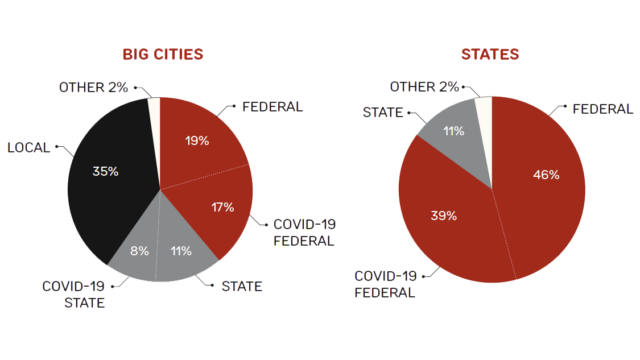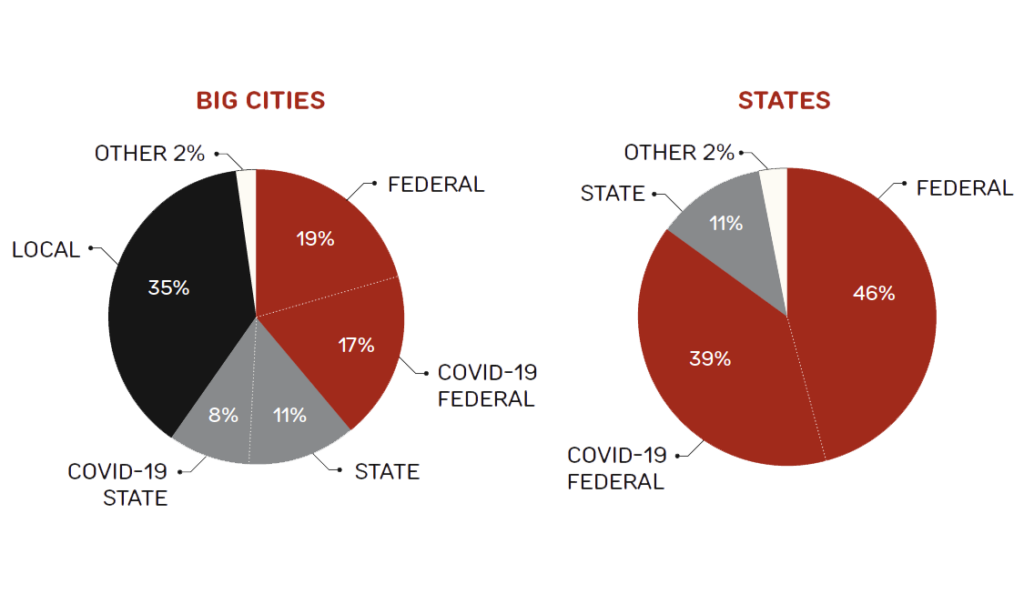Factsheet: U.S. Cities Need More Disease Experts
June 2022

The Big Cities Health Coalition (BCHC) and the Council of State and Territorial Epidemiologists (CSTE) recently assessed epidemiology capacity in 26 large urban health departments.1 Epidemiologists in BCHC member cities serve on the front lines of public health, protecting more than 61 million, or 1 in 5, Americans.
They play a critical role in public health by detecting and tracking numerous issues such as injuries and diseases in our communities. This report reflects the impact of the COVID pandemic on big city health departments and how federal resources to combat the pandemic are not reaching the front lines of health departments, where it is needed most.
EPIDEMIOLOGIST
noun ep·i·de·mi·ol·o·gist e -p- dē-mē- ˈä-l ˈ -jist
An expert scientist who studies, detects and tracks injuries and disease in our communities.
Epidemiology Capacity Assessment
Download the full report Epidemiology Capacity AssessmentEpidemiology Capacity Factsheet
Download a pdf factsheet Epidemiology Capacity FactsheetCore recommendations
Provide cross-training so epidemiologists can be flexible during emergencies.
Enhance skills in data analytics to support data modernization efforts.
Update salary scales to be competitive with other industries.
Set up pipelines to recruit additional epidemiologists, especially those with knowledge of advanced data analysis and emerging program areas like genomics.
Ensure epidemiologists have reliable access to the peer-reviewed research.
Where epidemiologists are—and where they’re needed
Big city health departments have shifted many of their epidemiologists to focus on COVID-19 and infectious disease. Our cities lack the full staff they need to address these areas and are even more short-staffed to address pressing chronic issues.
To reach full capacity, big city health departments need …
… and specifically need capacity increases in the following areas:
47%
more epidemiologists
177%
COVID-19
174%
infectious disease
Big city health department epidemiologists are working on …
48%
COVID-19
27%
infectious disease
8%
generalist
Big city health departments have the greatest unmet need for epidemiologists in these areas:
(Numbers indicate percentage of jurisdictions reporting inadequate capacity.)
96%
genomics
96%
occupational health
65%
mental health
65%
oral health
Epidemiologists declined in key program areas from 2017 to 2021
Over the last five years, key program areas experienced a decline in the number of epidemiologists. This makes us less prepared for the next pandemic and highlights a significant lack of capacity to collect and analyze data for challenges like obesity and tobacco, let alone emergent health risks.
(Data reported by the New York City Department of Health and Mental Hygiene, which participated in 2017 but not 2021, were excluded from these statistics.)
–40%
chronic disease
–31%
injury
–27%
preparedness
–21%
generalist
One Reason for the Gap
More local dollars support big city epidemiology; more federal dollars support states.

Epidemiology Capacity Assessment
Download the full report Epidemiology Capacity AssessmentEpidemiology Capacity Factsheet
Download a pdf factsheet Epidemiology Capacity FactsheetAbout the authors
The Big Cities Health Coalition (BCHC) is a forum for the leaders of America’s largest metropolitan health departments to exchange strategies and jointly address issues to promote and protect the health and safety of the 61 million people they serve.
Founded in 1951, the Council of State and Territorial Epidemiologists (CSTE) represents the interests of State Epidemiologists from all 50 U.S. states and territories, which forms the Council. CSTE is also the professional home to more than 2200 practicing applied epidemiologists at the state, local, tribal and territorial levels.
- A total of 26 of the 30 BCHC members at the time participated in the assessment. The information here represents the results from only those participating departments and their perceptions about capacity.